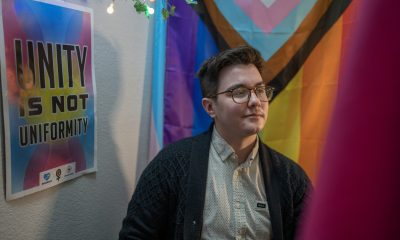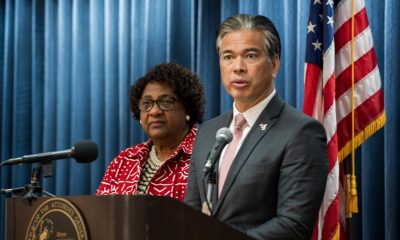News
Harris takes ‘full responsibility’ for briefs against surgery for trans inmates
2020 hopeful calls for ‘better understanding’ of needs for transgender community
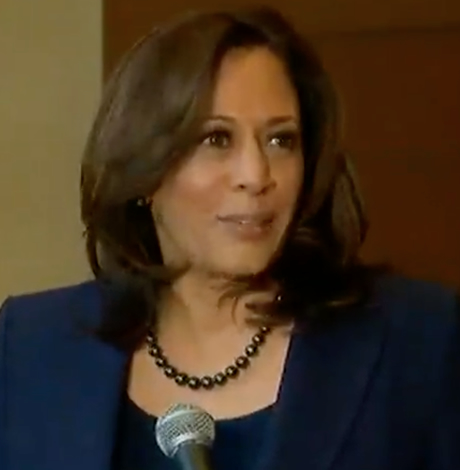
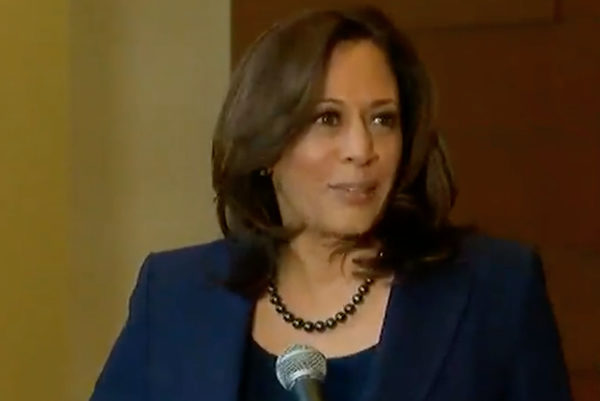
Sen. Kamala Harris said she takes “full responsibility” for legal briefs against surgery for transgender inmates. (Image public domain)
In her first news conference after announcing her 2020 presidential run, Sen. Kamala Harris (D-Calif.) said she takes “full responsibility” for legal briefs as California attorney general seeking to deny gender reassignment surgery for transgender inmates and called for a “better understanding” of needs — medical or otherwise— for transgender people.
Harris made the comments during a news conference Monday at Howard University in D.C. in response to a question from the Washington Blade, asking her about representing the California Department of Corrections & Rehabilitation in seeking to deny gender reassignment surgery prescribed to two transgender inmates in the California state prison system.
Initially, Harris defended her actions by asserting she was obligated to defend the state agency in her role as California attorney general, implying her personal position was contrary to that of the California Department of Corrections & Rehabilitation.
“I was, as you are rightly pointing out, the attorney general of California for two terms and I had a host of clients that I was obligated to defend and represent and I couldn’t fire my clients, and there are unfortunately situations that occurred where my clients took positions that were contrary to my beliefs,” Harris said.
Harris also suggested lawyers working for her in her role as California attorney general were taking approaches to these cases without her knowledge.
“And it was an office with a lot of people who would do the work on a daily basis, and do I wish that sometimes they would have personally consulted me before they wrote the things that they wrote?” Harris said. “Yes, I do.”
Ultimately, Harris said she takes responsibility for the litigation approach of her office because she was responsible as California attorney general.
“But the bottom line is the buck stops with me, and I take full responsibility for what my office did,” Harris said.
Harris indicated she also helped the California Department of Corrections & Rehabilitation come to an agreement to set up a process where transgender inmates could obtain transition-related care, including gender reassignment surgery. That’s similar to what her office later told the Blade in response to an article about concerns over her legal support for the position of the agency.
“On that issue I will tell you I vehemently disagree and in fact worked behind the scenes to ensure that the Department of Corrections would allow transitioning inmates to receive the medical attention that they required, they needed and deserved,” Harris said.
Transgender advocates have made the case that transgender inmates are entitled to receive the taxpayer-funded procedure because denying them medical treatment amounts to cruel and unusual punishment — a clear violation of the Eighth Amendment of the U.S. Constitution.
But a series of briefs signed by Harris during her tenure as California attorney general made the opposite case. In one brief dated April 10, 2015, Harris and other state attorneys dismiss the importance of gender reassignment surgery in seeking to appeal a court order granting the procedure to transgender inmate Michelle-Lael Norsworthy.
“Norsworthy has been treated for gender dysphoria for over 20 years, and there is no indication that her condition has somehow worsened to the point where she must obtain sex-reassignment surgery now rather than waiting until this case produces a final judgment on the merits,” the brief says.
It should be noted California didn’t come to an agreement to grant transgender inmates gender reassignment surgery until after a court decision ordering Norsworthy be granted the procedure. At least one transgender advocate in California has also said the California Department of Correction has built a reputation for not fulfilling the agreement reached on behalf of transgender inmates.
Asked by the Blade in a follow-up question to clarify whether transgender inmates across the country should have access to gender reassignment surgery, Harris called for a “better understanding” of the medical needs of transgender people.
“I believe that we are at a point where we have got to stop vilifying people based on sexual orientation and gender identity, and we’ve got to understand that when we are talking about a particular transgender community, for too long they have been the subject of bias, and frankly, a lack of understanding about their circumstance and their physical needs in addition to any other needs they have, and it’s about time that we have a better understanding of that,” Harris said.
The response arguably falls short of a recent statement from the presidential campaign of Elizabeth Warren asserting the candidate “supports access to medically necessary services,” including “at the VA, in the military or at correctional facilities.” The statement reversed Warren’s previously articulated opposition in 2012 to gender reassignment surgery for transgender inmates.
Other aspects of Harris’ record on LGBT issues in her time as California attorney general include refusing to defend in court California’s ban on same-sex marriage known as Proposition 8 and declining to certify a “Kill the Gays” ballot initiative proposed in California that would have (unconstitutionally) instituted the death penalty for homosexual acts.
Upon election to the U.S. Senate in 2016, Harris co-sponsored the Equality Act, legislation that seeks to bar anti-LGBT discrimination under federal law.
Taking the lead on other issues, Harris has also questioned the Trump administration over refusing to include questions in the U.S. Census allowing residents to identify their sexual orientation and gender identity. The California Democrat was also among three senators demanding answers from Immigration & Custom Enforcement about the death of transgender inmate Roxsana Hernández in immigration detention.
A transcript of the Q&A follows.
Blade: How would you address concerns about seeking to deny surgery for trans inmates as California AG?
Harris: So I was, as you are rightly pointing out, the attorney general of California for two terms and I had a host of clients that I was obligated to defend and represent and I couldn’t fire my clients, and there are unfortunately situations that occurred where my clients took positions that were contrary to my beliefs.
And it was an office with a lot of people who would do the work on a daily basis, and do I wish that sometimes they would have personally consulted me before they wrote the things that they wrote? Yes, I do. But the bottom line is the buck stops with me, and I take full responsibility for what my office did.
But on that issue I will tell you I vehemently disagree and in fact worked behind the scenes to ensure that the Department of Corrections would allow transitioning inmates to receive the medical attention that they required, they needed and deserved.
Blade: Should trans inmates access throughout the country have access to GRS?
Harris: I believe that we are at a point where we have got to stop vilifying people based on sexual orientation and gender identity, and we’ve got to understand that when we are talking about a particular transgender community, for too long they have been the subject of bias, and frankly, a lack of understanding about their circumstance and their physical needs in addition to any other needs they have, and it’s about time that we have a better understanding of that.
Northern California
West Hollywood Poetry Team brings home Poetry Slam Trophy
“The West Hollywood team brought brilliance to the Chill List stage,” said Chill List founder and host Sam Pierstorff
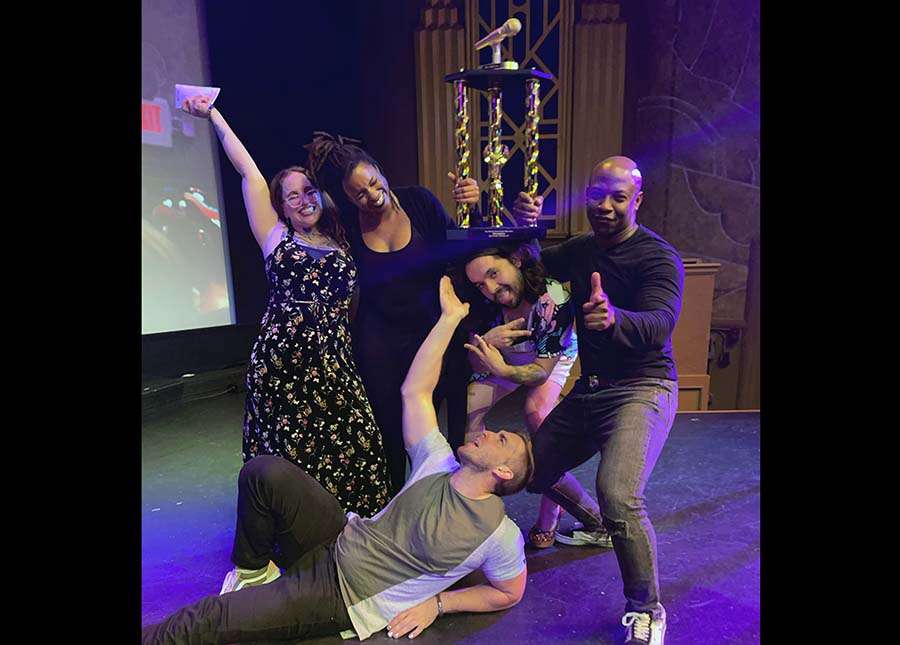
By Paulo Murillo | MODESTO, Calif. – The West Hollywood Poetry Team brought home the winning trophy after competing at the Chill List Poetry Slam Invitational in Modesto on Saturday, April 20. Amongst a competitive field, the West Hollywood poets emerged triumphant, claiming the top prize in a dynamic display of original verse.
The event, renowned for spotlighting the nation’s premier slam poetry collectives, saw teams vying for a $2000 award through a series of group and solo performances. Five judges from the audience awarded points to teams based on the strength of their poems and the quality of their performance. West Hollywood won with a cumulative score of 113.4, beating our competing teams from Oakland (111.4), Salt Lake City (110.1), and Visalia (108.7).
“The West Hollywood team brought brilliance to the Chill List stage,” said Chill List founder and host Sam Pierstorff. “Our Modesto audience loved their range from the humorous to the deeply emotional, intellectual, and inspirational.”
The genesis of the West Hollywood Slam Team dates back to July 2023, initiated by former West Hollywood Poet Laureate Brian Sonia-Wallace and poet/coach Nate Lovell, the architects behind The Mic @ Micky’s WeHo. Comprising both founders and five standout poets from Micky’s, including Meliza “Missy Fuego” Bañales, Dan “Pastiche Queen” Lovato, Tee Gardiner, and Raul Herrera, the team embodies the vibrant spirit of its locale.
According to Pastiche Queen, a team member, the collective mirrors the essence of West Hollywood itself, fostering a sense of community and mutual support. “The team operates as a microcosm of West Hollywood itself; nobody is gonna take care of us like we take care of us.”
Missy Fuego, a seasoned slam veteran and team member, underscored the historic significance of their ensemble. “The West Hollywood team is not only the first slam team in WeHo, it’s the first all Queer/Non-Binary/Non-Labeled Slam Team in North America,” they said. “For years, slam has typically been dominated by heterosexual and cis narratives, with one or two members representing the LGBTQ community. The West Hollywood Slam Team steps forth, proudly, as the first all-inclusive team to prioritize LGBTQ issues and culture as well as regularly center sexual orientation and gender.”
The West Hollywood Slam Team is currently creating a showcase performance with revolving guest poets, and is available for Pride performance bookings through rentpoet.com.
******************************************************************************************

Paulo Murillo is Editor in Chief and Publisher of WEHO TIMES. He brings over 20 years of experience as a columnist, reporter, and photo journalist. Murillo began his professional writing career as the author of “Love Ya, Mean It,” an irreverent and sometimes controversial West Hollywood lifestyle column for FAB! newspaper. His work has appeared in numerous print and online publications, which include the “Hot Topic” column in Frontiers magazine, where he covered breaking news and local events in West Hollywood. He can be reached at [email protected]
The preceding article was previously published at WeHo Times and is republished with permission.
Tennessee
Tennessee: Anti-LGBTQ parents can now foster, adopt LGBTQ kids
Advocates have pushed back to say that plain language of the law does not require the state to take into account the child’s own wishes
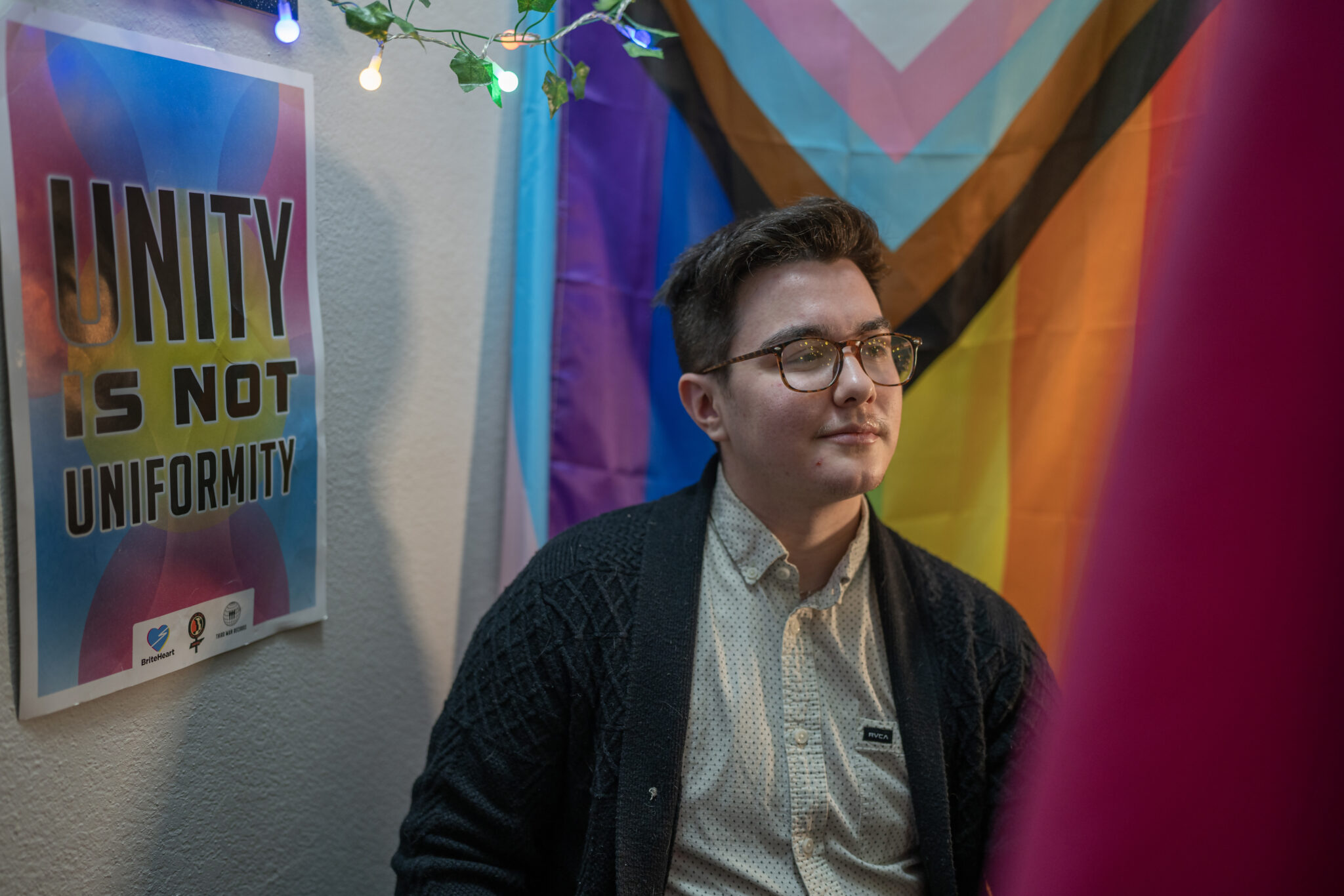
By Anita Wadhwani | NASHVILLE, Tenn. – With Gov. Bill Lee’s signature, Tennessee last week became the first state in the nation to establish the right of adults who claim moral or religious objections to LGBTQ identity to foster and adopt LGBTQ kids.
In the days since the law became effective, the Department of Children’s Services (DCS) has shelved a 10-year-old policy that said children in state custody must receive care that “promotes dignity and respect for all children/youth and families inclusive of their gender identity, gender expression and sexual orientation.”
That policy is now “under review and will be updated on the web site once the review is complete,” DCS spokesperson Ashley Zarach said. New guidelines for how the state will navigate foster kids’ sexual orientation and gender identity in deciding where to place them are expected to be hashed out in the coming months.
The law’s passage has raised alarms among advocates for LGBTQ youth in Tennessee and elsewhere, who say it upends a central principle of child welfare systems: prioritizing the best interest of a child.
Instead, they say, the law gives gives greater weight to a prospective parent’s religious and moral beliefs over the need of a child for a loving, safe and supportive home.
“What’s really sad about this is there’s a really high volume of LGBTQ+ kids in the foster system whose needs aren’t being met now,” said Molly Quinn, executive director of OUTMemphis. Among the LGBTQ nonprofit’s programs is one that aids 18- to 24-year-old LGBTQ youth facing homelessness, many of whom are former foster kids who faced a tough time in the child welfare system.
“The fact that the state would accept a family that is willing to discriminate into this broken system with such vulnerable kids is difficult to understand,” she said.
Best interests of the child?
The law, formally called the Tennessee Foster and Adoptive Parent Protection Act, was backed overwhelmingly by Tennessee Republican lawmakers, who two years ago also approved a first-of-its-kind law allowing private adoption and foster care agencies that accept tax dollars to reject prospective parents for a variety of religious or moral reasons, including their faith or whether they are LGBTQ.
“In advocating for this year’s bill, Dickson Republican Rep. Mary Littleton characterized it as a necessary safeguard for families who want to offer loving homes to foster and adoptive kids but worry that they would have to compromise their faith or moral beliefs. Littleton also cited an urgent need for more willing families to step forward. Tennessee currently has 4,948 fully approved foster homes, but needs 400 more.
At the end of the day the state should be acting in the best interest of the kids and this doesn’t do this. This puts emphasis on beliefs of foster and adoptive parents.” – Laura Brennan, Family Equity
Littleton stressed that the new law says DCS is not precluded from taking a child’s preferences into account before placing them in a home.
“This bill does not disregard the values and beliefs of the child,” Littleton said, noting state child welfare officials can still take into account “a comprehensive list of factors.” before placing any child in any home.
Advocates have pushed back to say that plain language of the law does not require the state to take into account the child’s own wishes.
They also criticized what they call a mischaracterization by the law’s supporters that prospective foster and adoptive parents in Tennessee have been rejected for holding anti-LGBTQ beliefs.
Parents in Tennessee have not been required to be gender- or sexual-orientation-affirming as a condition of becoming approved as a foster or adoptive parent. They have, however, been required to promote dignity and respect of a child’s identity if they take an LGBTQ kid in their home — until now.
DCS: parents preferences already taken into account
According to the Department of Children’s Services, prospective parents’ “preferences” have routinely been taken into account before a child is placed in a home, a spokesperson for the Department of Children’s Services said in a statement.
“Prior to this legislation, the DCS home study process included asking prospective foster and adoptive parents a series of questions to identify their placement preferences,” a statement from DCS said.
“Among those are questions regarding willingness to parent a child who identifies as LGBTQ+. Our goal always is to find the most appropriate placement to meet the unique needs of each child in our care,” the statement said.
Tennessee currently has 8,854 kids in state custody — 6,686 of them residing in foster homes. Up to a third of all foster youth nationwide identify as LBGTQ — often kicked out of home or winding up in state custody as a result of mistreatment or rejection based on their gender identity, according to the U.S. Department of Health and Human Services.
Jace Wilder, education manager Tennessee Equality Project, an LGBTQ+ advocacy organization that has vocally opposed the law, pointed to his own tough childhood as an example of the importance of supportive adults in a child’s life.
Wilder, who is transgender, was raised, in part, by a friend’s parents after suffering abuse at the hands of his father, he said. His mother was disabled and frequently hospitalized.
Wilder said the abuse wasn’t solely because of his gender identity, but “it kind of gave him more ammo to use against me, so that did not help.” He was also able to connect with LGBTQ people for support in his teens and college years, he said.
“Without finding people that accepted me and really helped me grow, I think I would have been stuck in the position of being too afraid to transition, too afraid of being out.” he said. “I think this puts kids at risk of being abused, neglected and harmed again.”
The nature of discourse over LGBTQ youth in Tennessee already exemplifies the need for safe and affirming homes, said Eli Givens, a college freshman from Tennessee who also serves as an advocate for the Tennessee Equality Project.
“It’s been just really unbelievable watching this session,” Givens said. “I’ve had adults telling me I need to go gas myself, that I was clearly molested when I was younger, just a wide array of threats,” they said.
“It’s bewildering that the same adults who told me to gas myself can adopt an LGBTQ child. That’s an extremely scary reality.”
Tennessee AG pushes back on proposed federal LGBTQ foster protections
The law was enacted on the heels of proposed new rules currently being considered by the U.S. The Department of Health and Human Services related to the placement of LGBTQI+ youth in foster care. Among the proposed rules for all foster homes is they “establish an environment free of hostility, mistreatment, or abuse based on the child’s LGBTQI+ status.”
In November, Tennessee Attorney General Jonathan Skrmetti led a 17-state coalition opposing the rules, saying in a letter to the federal government that they would shrink the pool of available foster families and “further divert resources away from protecting foster children from physical abuse and toward enforcing compliance with controversial gender ideology.”
Laura Brennan, associate director for child welfare policy for Family Equality, which advocates for LGBTQ families, said national advocates are keeping a close eye on what’s happening in Tennessee. The state’s 2022 law allowing publicly-funded private adoption and foster care agencies to exclude LGBTQ parents has seen been adopted by 13 other states, she said.
“At the end of the day the state should be acting in the best interest of the kids and this doesn’t do this,” she said. “This puts emphasis on beliefs of foster and adoptive parents.”
******************************************************************************************

Anita Wadhwani is a senior reporter for the Tennessee Lookout. The Tennessee AP Broadcasters and Media (TAPME) named her Journalist of the Year in 2019 as well as giving her the Malcolm Law Award for Investigative Journalism. Wadhwani is formerly an investigative reporter with The Tennessean who focused on the impact of public policies on the people and places across Tennessee.
******************************************************************************************
The preceding piece was previously published by the Tennessee Lookout and is republished with permission.
Now more than ever, tough and fair journalism is important. The Tennessee Lookout is your watchdog, telling the stories of politics and policy that affect the people of the Volunteer State.
We’re part of States Newsroom, the nation’s largest state-focused nonprofit news organization.
Southern California
Bonta files for permanent ban of Chino school’s forced outing policy
Bonta noted that the policy was detrimental to the physical, emotional safety, well-being, & privacy of trans students
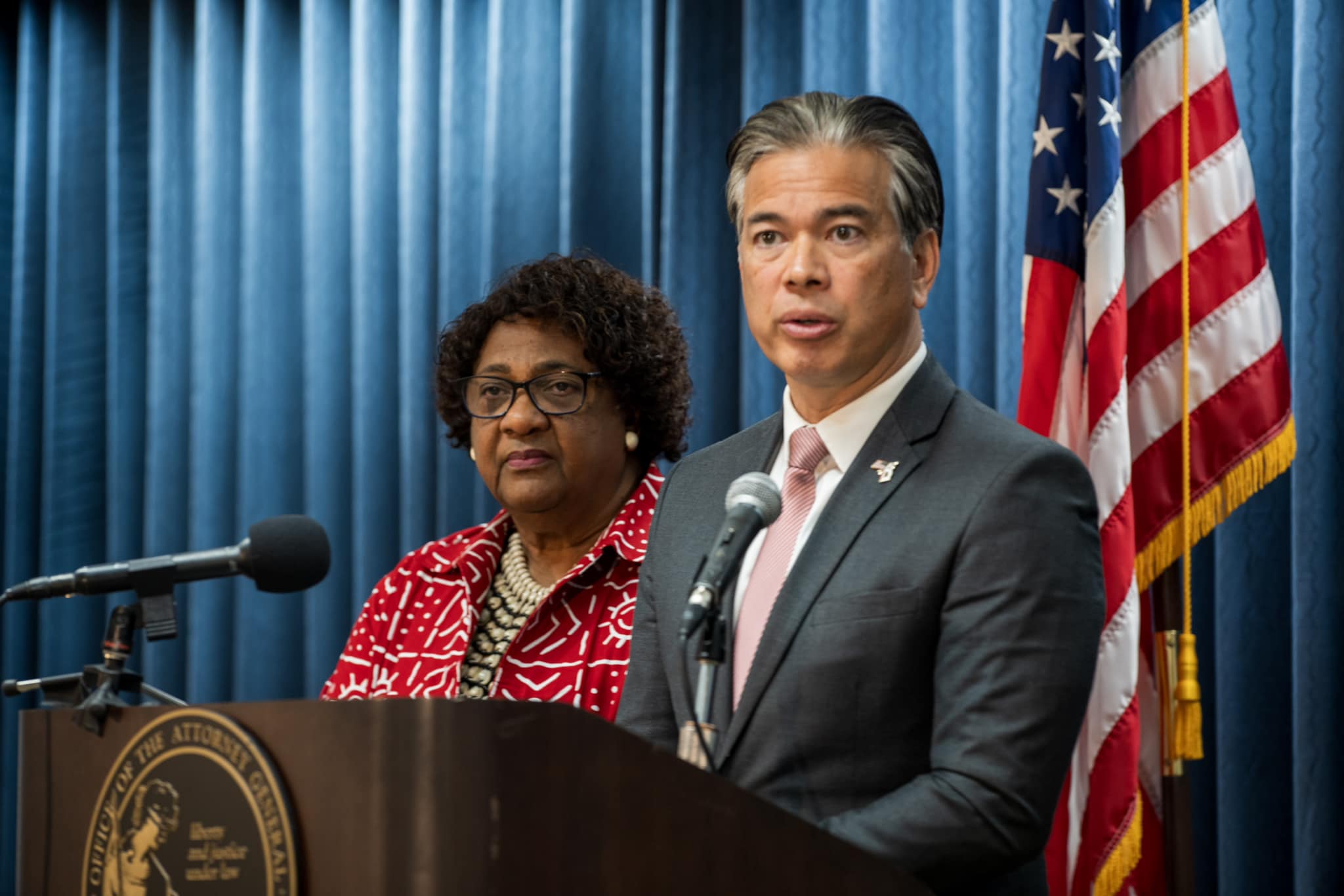
OAKLAND, Calif. — California Attorney General Rob Bonta today filed a motion for final judgment in Bonta v. Chino Valley Unified School District seeking injunctive and declaratory relief to ensure that the Chino Valley Unified School District Board of Education (Board) does not reenact or implement their recently-rescinded forced outing policy.
In a press release, the Attorney General noted that the policy – Policy 5020.1 – was detrimental to the physical and emotional safety, well-being, and privacy of transgender and gender-nonconforming students.
In August 2023, Attorney General Bonta sued to challenge the policy on the basis that it violated students’ civil and constitutional rights under California law, and in October 2023, obtained a preliminary injunction enjoining the facially discriminatory provisions of the forced outing policy. While the District voted to rescind the forced outing policy on March 7, 2024, in response to the San Bernardino County Superior Court’s preliminary injunction order, the District’s Board continues to stand “proudly” by Policy 5020.1, the District’s counsel continues to maintain that it was “common sense and constitutional,” and the District continues to make comments echoing the anti-trans comments they made publicly before enacting the policy.
As a result, Attorney General Bonta is seeking a permanent injunction and declaratory relief to protect students’ civil rights and ensure that the Board does not reenact or implement its original, discriminatory policy.
“Chino Valley Unified has an obligation to protect the safety and well-being of the students it is charged to serve, especially our most vulnerable student communities who are susceptible to violence and harassment,” said Attorney General Bonta. “It took a lawsuit and court order to get Chino Valley to rescind their discriminatory forced outing policy, but even now, the Board has continued to assert that it was lawful, and board members continue to echo the anti-trans rhetoric they relied upon when passing it. Today’s motion seeks to ensure no child becomes a target again by blocking Chino Valley Unified from ever adopting another forced outing policy. As we continue to defend the rights of transgender and gender-nonconforming students, I urge all school districts to take note and ensure every student can enjoy their right to learn and thrive in a school environment that promotes safety, privacy, and inclusivity.”
Even though Attorney General Bonta issued a letter to the Board on July 20, 2023 stressing the potential harms and infringements on students’ civil rights from the adoption of Board Policy 5020.1, the Board enacted the policy nonetheless. The forced outing policy required schools to inform parents, with minimal exceptions, whenever a student requested to use a name or pronoun different from that on their birth certificate or official records, even without the student’s permission and even when disclosure would cause physical or mental harm to the student.
The policy also required notification if a student requested to use facilities or participate in programs that did not align with their sex on official records. In August 2023, Attorney General Bonta announced a lawsuit challenging the enforcement of Policy 5020.1, asserting it violated several state protections safeguarding students’ civil and constitutional rights.
Shortly after securing a temporary restraining order, the San Bernardino Superior Court issued a preliminary injunction against the Board’s forced outing policy in October 2023. The Court held that several provisions violated California’s equal protection clause and discriminated against transgender and gender-nonconforming students, causing them irreparable harm.
In today’s motion seeking a permanent injunction and declaratory relief against the forced outing policy, Attorney General Bonta underscores the importance of the Court’s issuance of final adjudication to guarantee the safety and well-being of transgender and gender-nonconforming students from future identical or similar forced outing policies, and declare that the forced outing policy violates students’ constitutional and statutory rights to be free from unequal and discriminatory treatment on the basis of sex, gender, and gender identity.
As part of today’s motion, Attorney General Bonta urges the Court to issue a final judgment because a live controversy exists, as the District’s conduct signals that it could re-adopt the discriminatory policy absent a final ruling by the Court, the discriminatory message communicated by the enactment of a discriminatory policy must still be redressed, and the case presents clear issues of public interest broadly affecting students, parents, school officials, and teachers that are likely to recur.
The Attorney General underscores the importance of securing final injunctive and declaratory relief against Policy 5020.1 to:
- Prevent the Board from re-enacting the discriminatory forced outing policy in the absence of a final injunction.
- Provide relief against the stigmatic harms inflicted by the Board’s adoption of the forced outing policy.
- Declare that the Board’s forced outing policy violates California’s equal protection and antidiscrimination laws.
Today’s motion also asserts the Board’s plain motivations in adopting Policy 5020.1 were to create and harbor animosity, discrimination, and prejudice towards transgender and gender-nonconforming students, without any compelling reason to do so, as evidenced by statements made during the Board’s hearing.
In discussing the policy before its passage, board members made a number of statements describing students who are transgender or gender-nonconforming as suffering from a “mental illness” or “perversion”, or as being a threat to the integrity of the nation and the family. The Board President went so far as to state that transgender and gender nonconforming individuals needed “non-affirming” parental actions so that they could “get better.”
The Attorney General has a substantial interest in protecting the legal rights, physical safety, and mental health of children in California schools, and in protecting them from trauma, harassment, bullying, and exposure to violence and threats of violence. Research shows that protecting a transgender student’s ability to make choices about how and when to inform others is critical to their well-being, as transgender students are exposed to high levels of harassment and mistreatment at school and in their communities when those environments are not supportive of their gender identity.
- One-in-10 respondents in a 2015 national survey said that an immediate family member had been violent toward them because they were transgender, and 15% ran away from home or were kicked out of their home because they were transgender. Fewer than one-in-three transgender and gender nonbinary youth found their home to be gender-affirming.
- Nearly 46% of transgender students reported missing at least one day of school in the preceding month because they felt unsafe or uncomfortable there and 17% of transgender students reported that they left a K-12 school due to the severity of the harassment they experienced at school.
- Seventy-seven percent of students known or perceived as transgender reported negative experiences such as harassment and assault, and over half of transgender and nonbinary youth reported seriously considering suicide in the past year.
A copy of the motion seeking declaratory and injunctive relief is available here.
Pennsylvania
Kenyatta may become first LGBTQ statewide elected official in Pa.
Penn. state Rep. Malcolm Kenyatta, who is running for auditor general is an active surrogate in the Biden-Harris 2024 reelection campaign
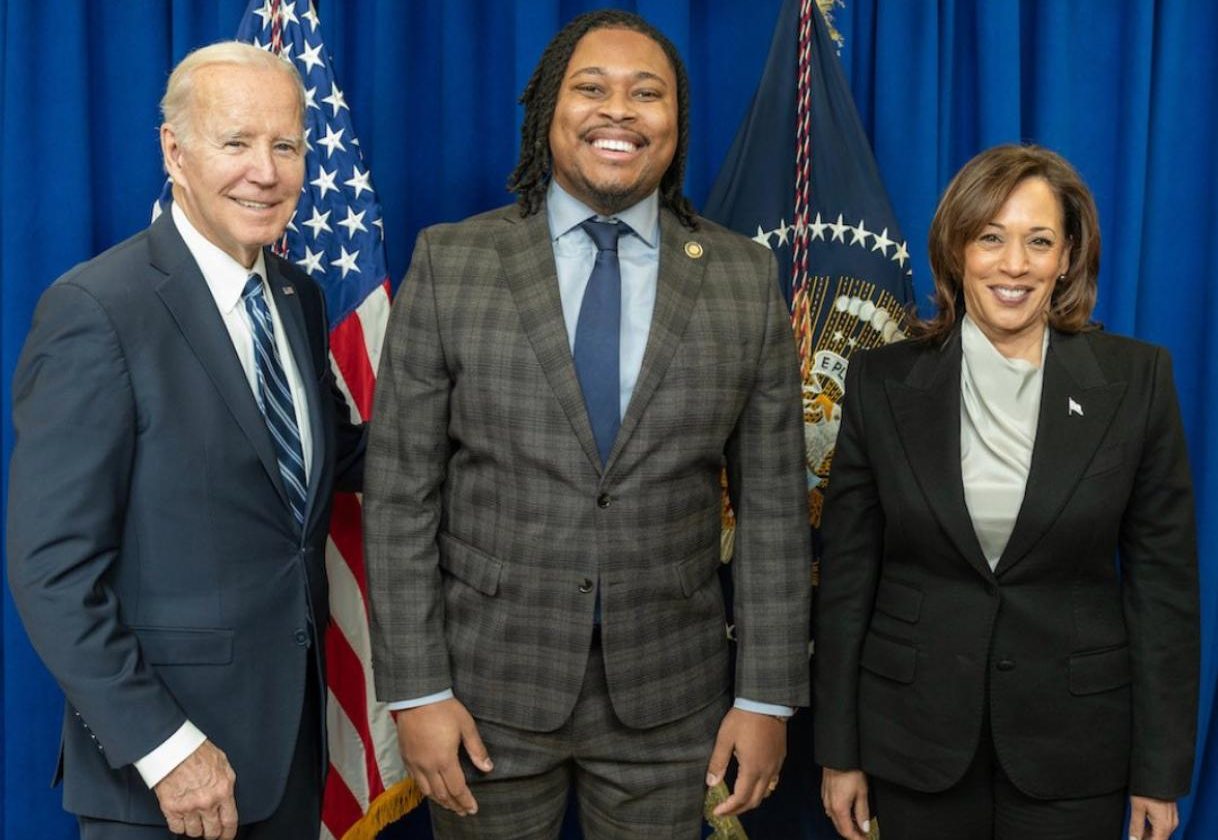
PHILADELPHIA County, Penn. — Following his win in the Democratic primary contest on Wednesday, Pennsylvania state Rep. Malcolm Kenyatta, who is running for auditor general, is positioned to potentially become the first openly LGBTQ elected official serving the commonwealth.
In a statement celebrating his victory, LGBTQ+ Victory Fund President Annise Parker said, “Pennsylvanians trust Malcolm Kenyatta to be their watchdog as auditor general because that’s exactly what he’s been as a legislator.”
“LGBTQ+ Victory Fund is all in for Malcolm, because we know he has the experience to win this race and carry on his fight for students, seniors and workers as Pennsylvania’s auditor general,” she said.
Parker added, “LGBTQ+ Americans are severely underrepresented in public office and the numbers are even worse for Black LGBTQ+ representation. I look forward to doing everything I can to mobilize LGBTQ+ Pennsylvanians and our allies to get out and vote for Malcolm this November so we can make history.”
In April 2023, Kenyatta was appointed by the White House to serve as director of the Presidential Advisory Commission on Advancing Educational Equity, Excellence and Economic Opportunity for Black Americans.
He has been an active surrogate in the Biden-Harris 2024 reelection campaign.
The White House
Biden announces action plan targeting pollutants in drinking water
The administration has led more than 500 programs geared toward communities most impacted by health and safety hazards like pollution
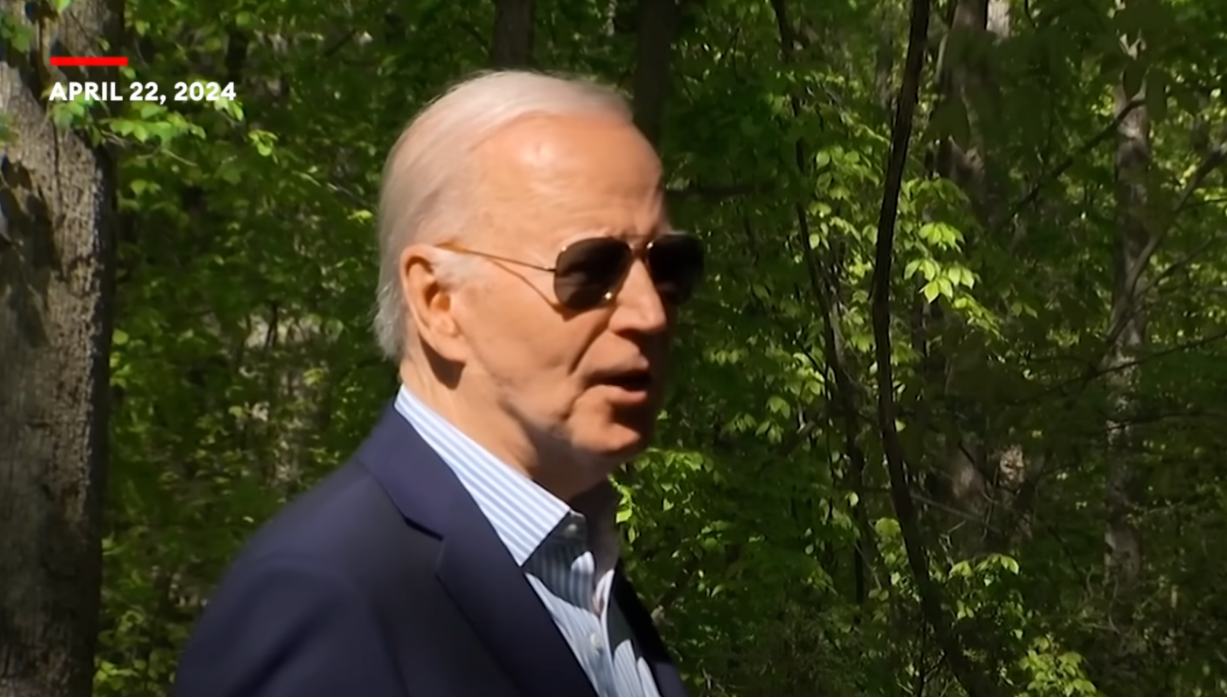
WASHINGTON — Headlining an Earth Day event in Northern Virginia’s Prince William Forest on Monday, President Joe Biden announced the disbursement of $7 billion in new grants for solar projects and warned of his Republican opponent’s plans to roll back the progress his administration has made toward addressing the harms of climate change.
The administration has led more than 500 programs geared toward communities most impacted by health and safety hazards like pollution and extreme weather events.
In a statement to the Washington Blade on Wednesday, Brenda Mallory, chair of the White House Council on Environmental Quality, said, “President Biden is leading the most ambitious climate, conservation, and environmental justice agenda in history – and that means working toward a future where all people can breathe clean air, drink clean water, and live in a healthy community.”
“This Earth Week, the Biden-Harris Administration announced $7 billion in solar energy projects for over 900,000 households in disadvantaged communities while creating hundreds of thousands of clean energy jobs, which are being made more accessible by the American Climate Corps,” she said. “President Biden is delivering on his promise to help protect all communities from the impacts of climate change – including the LGBTQI+ community – and that we leave no community behind as we build an equitable and inclusive clean energy economy for all.”
Recent milestones in the administration’s climate policies include the U.S. Environmental Protection Agency’s issuance on April 10 of legally enforceable standard for detecting and treating drinking water contaminated with polyfluoroalkyl substances.
“This rule sets health safeguards and will require public water systems to monitor and reduce the levels of PFAS in our nation’s drinking water, and notify the public of any exceedances of those levels,” according to a White House fact sheet. “The rule sets drinking water limits for five individual PFAS, including the most frequently found PFOA and PFOS.”
The move is expected to protect 100 million Americans from exposure to the “forever chemicals,” which have been linked to severe health problems including cancers, liver and heart damage, and developmental impacts in children.
An interactive dashboard from the United States Geological Survey shows the concentrations of polyfluoroalkyl substances in tapwater are highest in urban areas with dense populations, including cities like New York and Los Angeles.
During Biden’s tenure, the federal government has launched more than 500 programs that are geared toward investing in the communities most impacted by climate change, whether the harms may arise from chemical pollutants, extreme weather events, or other causes.
New research by the Williams Institute at the UCLA School of Law found that because LGBTQ Americans are likelier to live in coastal areas and densely populated cities, households with same-sex couples are likelier to experience the adverse effects of climate change.
The report notes that previous research, including a study that used “national Census data on same-sex households by census tract combined with data on hazardous air pollutants (HAPs) from the National Air Toxics Assessment” to model “the relationship between same-sex households and risk of cancer and respiratory illness” found “that higher prevalence of same-sex households is associated with higher risks for these diseases.”
“Climate change action plans at federal, state, and local levels, including disaster preparedness, response, and recovery plans, must be inclusive and address the specific needs and vulnerabilities facing LGBT people,” the Williams Institute wrote.
With respect to polyfluoroalkyl substances, the EPA’s adoption of new standards follows other federal actions undertaken during the Biden-Harris administration to protect firefighters and healthcare workers, test for and clean up pollution, and phase out or reduce use of the chemicals in fire suppressants, food packaging, and federal procurement.
Africa
For queer Nigerians, being on gay dating apps is still risky
Homophobes target users for violence

By Elvis Kachi | LAGOS, Nigeria — Gay hookup apps like Grindr, and dating apps like Tinder and Bumble have managed to proliferate queer communities in countries like Nigeria.
Those who seek one night stands find what they want while those looking for love equally find what they seek. These platforms have managed to position themselves as safe spaces for queer people in anti-gay Nigeria. In recent times, however, it is proving to be unsafe, as homophobic people are quickly learning about the apps, and opening accounts that either seek to outrightly threaten queer people, or pretend to be queer, have long chats with gay people, invite them over, and inflict violence on them.
Take the case of Biodun, a queer Nigerian man who joined Grindr to meet up with guys like him.
After Biodun had built a connection and agreed to meet with someone whose display name was “Mamba,” they decided to meet up only for him to be met with violence. Apparently, Mamba ran a catfish account.
“I’ll never forget that day,” Biodun, who asked the Washington Blade not to use his last name because of safety concerns, said. “I still think about it, and sometimes blame myself for being very careless, even though Grindr was supposed to be our safe space.”
Biodun’s experience isn’t peculiar to him.
In Nigeria, draconian laws that criminalize same-sex relationships exist, making queer people turn to the digital realm to explore their identities and seek connections beyond the confines of societal oppression that comes with the physical environment. Gay dating apps such as Grindr, therefore, have emerged as virtual sanctuaries, offering spaces for queer Nigerians to forge friendships, find solidarity, and pursue romantic or sexual relationships. Spaces like this, however, have morphed into a landscape fraught with danger, as homophobic people have weaponized these platforms to perpetuate hate and violence.
“Sometimes, I often wonder how they learned about these platforms,” Daniel, which is not his real name, told the Blade. “You would think that it is just us in the platforms, until you find out that the accounts are rooted in homophobia.”
One time, someone’s bio read, “I’m only here to deal with the gay people. I know all of you, and I will find and kill you. We no want una for here (translates to “We do not want you here,” in English.)” It was a stark reminder that these spaces are no longer LGBTQ+-friendly for Nigerians. In 2014, there was the passage of the Same-Sex Marriage Prohibition Act by former President Goodluck Jonathan, which not only criminalized same-sex unions, but also imposed severe penalties on anyone involved in LGBTQ+ advocacy or support.
This law catalyzed a surge in discrimination and violence against queer Nigerians; emboldening regular civilians, religious extremists, and even law enforcement agencies to target individuals perceived as deviating from traditional gender and sexual norms. Again, amid this hostile environment, gay dating apps emerged as lifelines for many queer Nigerians, offering avenues for discreet communication, community building, and the pursuit of intimate relationships.
The very anonymity and freedom these apps provided, however, became double-edged swords.
The advent of screenshot and screen-recording capabilities on these apps, for example, reduced the risks of exposure, strengthening the safety and privacy of users. However, this also comes with its own lapses, as queer people using Grindr have often relied on screenshots and screen recordings to confirm the identities of potentials with their friends, before accepting to meet.
“Before the removal of the screenshot option, I usually shared photos of others with my trusted friends,” Biodun shared. “But since that was taken off, there was no way for me to do that.”
Although, according to Grindr’s terms and conditions, the removal came with privacy concerns, as it was to facilitate a safe dating experience.
This erosion of digital safe spaces is depriving queer Nigerians of vital avenues for self-expression and affirmation, and is exacerbating the psychological toll of living in a society that continues to systematically demonize their identities. Moreover, the normalization of homophobic rhetoric and violence in both physical and digital realms has perpetuated a cycle of fear and oppression, and is reinforcing this notion that LGBTQ+ individuals are inherently unworthy of dignity and respect. Despite these challenges, though, the resilience of queer Nigerians continue to persist, as they defy societal norms and assert their right to love and be loved.
*****************************************************************************************
Elvis Kachi is a Nigerian fashion and culture journalist. He’s had in pieces featured across platforms like BBC, Thomson Reuters, Essence Magazine, Condé Nast’s Them, etc. www.elviskachi.com
Research/Study
90 percent of trans youth live in states restricting their rights
Slightly more than 75% of trans youth live in 40 states passed laws or had pending bills that restrict access to gender-affirming care
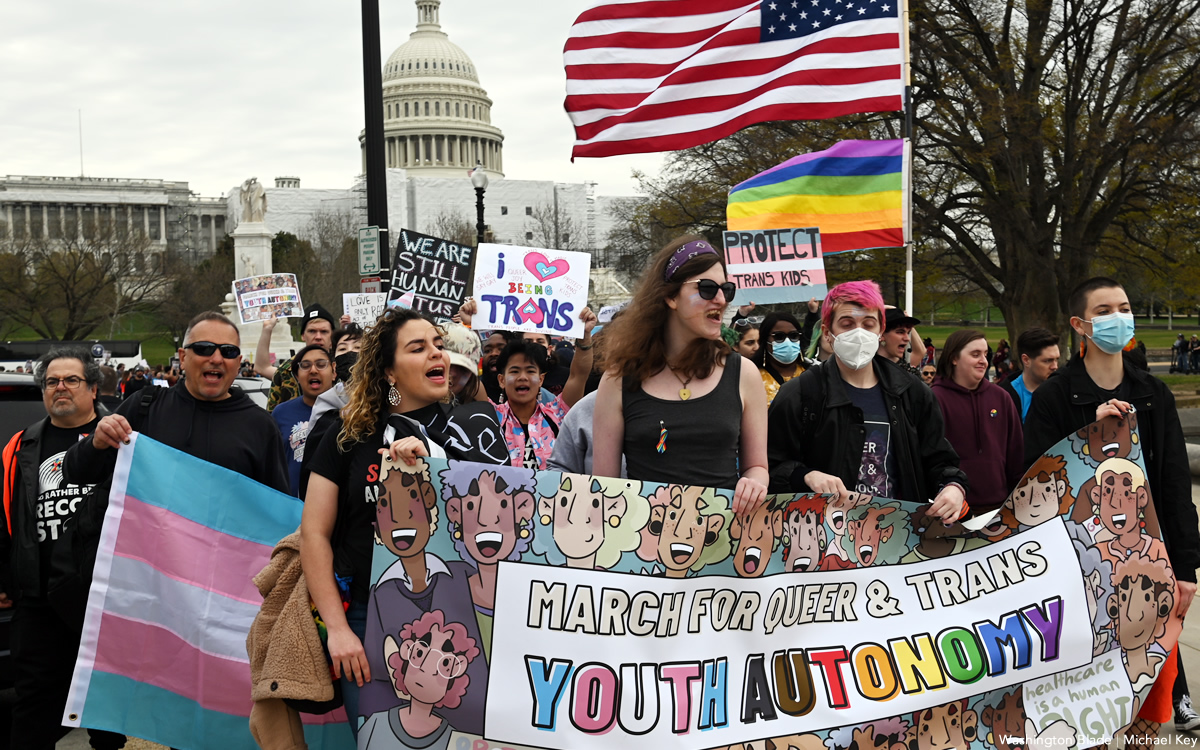
LOS ANGELES – According to a new report by the Williams Institute at UCLA School of Law, 93% of transgender youth aged 13 to 17 in the U.S.—approximately 280,300 youth—live in states that have proposed or passed laws restricting their access to health care, sports, school bathrooms and facilities, or the use of gender-affirming pronouns.
In some regions, a large percentage of transgender youth live in a state that has already enacted one of these laws. About 85% of transgender youth in the South and 40% of transgender youth in the Midwest live in one of these states.
An estimated 300,100 youth ages 13 to 17 in the U.S. identify as transgender. Nearly half of transgender youth live in 14 states and Washington D.C. that have laws that protect access to gender-affirming care and prohibit conversion therapy.
All transgender youth living in the Northeast reside in a state with either a gender-affirming care “shield” law or a conversion therapy ban, while almost all transgender youth in the West (97%) live in a state with one or both protective laws.
“For the second straight year, hundreds of bills impacting transgender youth were introduced in state legislatures,” said lead author Elana Redfield, Federal Policy Director at the Williams Institute. “The diverging legal landscape has created a deep divide in the rights and protections for transgender youth and their families across the country.”
KEY FINDINGS:
Restrictive Legislation
Bans on gender-affirming care
| 237,500 transgender youth—slightly more than three-quarters of transgender youth in the U.S.—live in 40 states that have passed laws or had pending bills that restrict access to gender-affirming care.113,900 transgender youth live in 24 states that have enacted gender-affirming care bans.123,600 youth live in 16 additional states that had a gender-affirming care ban pending in the 2024 legislative session. |
Bans on sports participation
| 222,500 transgender youth—nearly three-quarters of transgender youth in the U.S.—live in 41 states that have passed laws or had pending bills that restrict participation in school sports.120,200 transgender youth live in 27 states where access to sports participation is restricted or state policy encourages restriction.102,300 transgender youth live in 14 additional states that had a sports ban pending in the 2024 legislative session. |
School bathroom bans
| 117,000 transgender youth live in 30 states that have passed laws or had pending bills that ban transgender students from using school bathrooms and other facilities that align with their gender identity.38,600 transgender youth live in 13 states that explicitly or implicitly ban bathroom access.78,400 transgender youth live in 17 additional states that had a bathroom ban pending in the 2024 legislative session. |
Bans on pronoun use
| 121,100 transgender youth live in 31 states that have passed laws or had pending bills that restrict or prohibit the use of gender-affirming pronouns.49,100 transgender youth live in 14 states that have restricted or banned pronoun use, particularly in schools or state-run facilities.72,000 transgender youth live in 17 additional states that had a restriction or prohibition pending in the 2024 legislative session. |
Gender-affirming care “shield” laws
| 163,800 transgender youth—over half of transgender youth in the U.S.—live in 18 states and D.C. that have passed gender-affirming care “shield” laws or had pending bills that protect access to care.146,700 transgender youth live in 14 states and D.C. that have passed these protections.17,100 transgender youth live in four additional states that had a “shield” law pending in the 2024 legislative session. |
Conversion therapy bans
| 204,800 transgender youth live in 31 states and D.C. that ban conversion therapy or had pending bills that prohibit the practice for minors.198,000 transgender youth—about two-thirds of transgender youth in the U.S.—live in 27 states and D.C. that ban conversion therapy for minors.6,800 transgender youth live in four additional states that had a ban pending in the 2024 legislative session. |
| “A growing body of research shows that efforts to support transgender youth are associated with better mental health,” said co-author Kerith Conron, Research Director at the Williams Institute. “Restrictions on medically appropriate care and full participation at school exacerbate the stress experienced by these youth and their families.” |
Read the report: (Here)
Ventura County
“Queers in the Valley” Ojai launches & is ready to celebrate Pride
Queers in the Valley are fundraising for Ojai’s first ever Pride Picnic & Celebration following the 33rd annual Pride Walk on June 30th, 2024
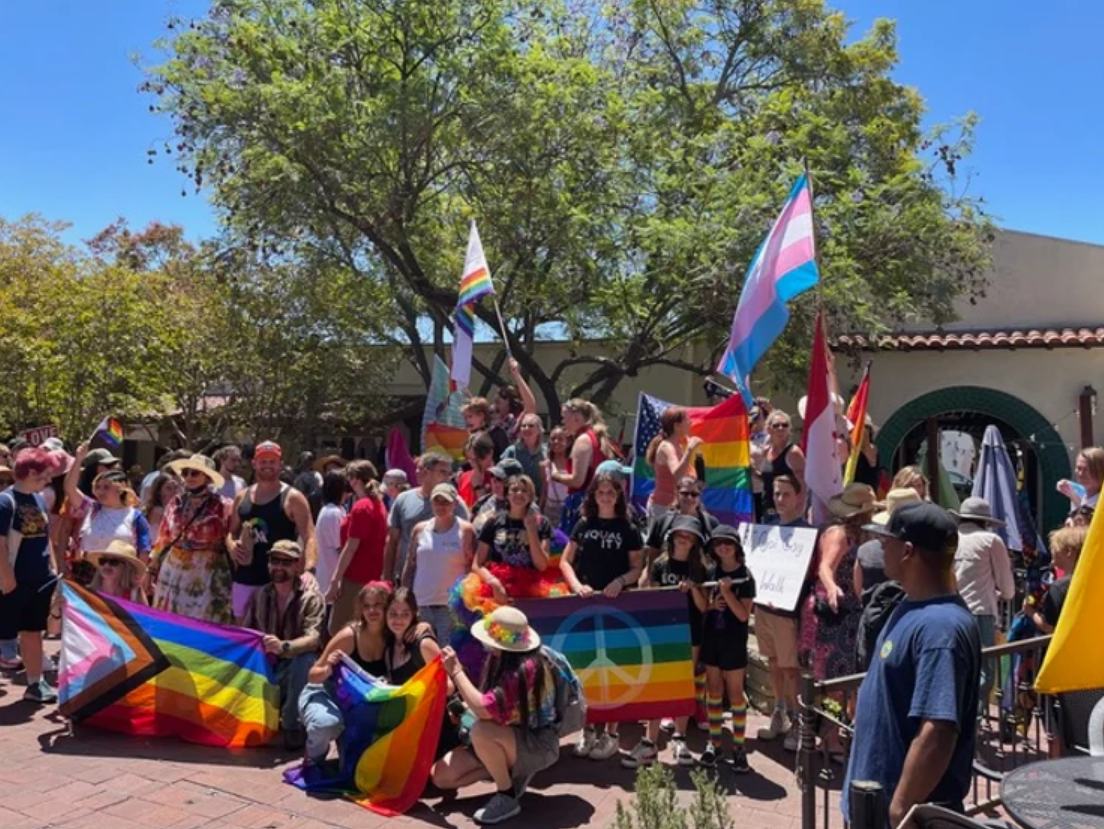
OJAI, Calif. – JoEllen Depakakibo, founder of Pinhole Coffee in San Francisco’s charming Bernal Heights has resettled in northeastern Ventura County with a new mission, a Pride Picnic & Celebration in Ojai.
Depakakibo along with her wife and child now call Ojai home and when not running a Pinhole Coffee EV-van have gathered with other LGBTQ+ community members launching the effort to raise funds for Ojai’s first Pride Picnic & Celebration.
The Pride Picnic & Celebration following the 33rd annual Pride Walk on Sunday, June 30th, 2024. According to a Facebook Post by Depakakibo, organizers enlisted the help of Rachel Lang the first out LGBTQ+ Ojai City Councilmember and support from Ojai Mayor Betsy Stix.
In a GoFundMe page and on the group’s ‘Queers in the Valley’ website the group is soliciting assistance to fund their efforts:
We are Queers in the Valley, and are fundraising for Ojai’s first ever Pride Picnic & Celebration following the 33rd annual Pride Walk on Sunday, June 30th, 2024!
Our mission is to find, build, strengthen, support and inspire the Queer Community in Ojai Valley. Our intention is to make it as Ojai as possible, and lay a foundation of safety and inclusion for our Trans, BIPOC, Disabled, and Low-Income Queer Family.
Help us raise $3000 to:
– pay our Queer Entertainers
– pay our Queer Graphic Designer and build out our website
– print signs and flyers
– rent Libbey Park
– make the event as accessible as possible for BIPOC, Disabled, and Low Income folx through things like ASL interpretation, non-police security, free covid testing, discounts for food options, etc.
– purchase 1-day event insurance
– pay for materials for such things as a kids crafting corner
Send us a message if you want to get involved!
The group noted:
If you are a local Queer artist, vendor or organization that wants to be featured on our website/want to volunteer/have any suggestions or questions…reach out to us (contact info on website).
This group was started with the yearning of mentioned intentions above from many people. Representation matters
Maine
Maine’s Governor Mills signs trans & abortion sanctuary bill into law
Despite a series of bomb threats against legislators in the state, Gov. Janet Mills has signed a trans & abortion sanctuary bill

By Erin Reed | AUGUSTA, Maine – On Tuesday, Gov. Janet Mills of Maine signed LD 227, a sanctuary bill that protects transgender and abortion providers and patients from out-of-state prosecution, into law.
With this action, Maine becomes the 16th state to explicitly protect transgender and abortion care in state law from prosecution. This follows several bomb threats targeting state legislators after social media attacks from far-right anti-trans influencers such as Riley Gaines and Chaya Raichik of Libs of TikTok.
An earlier version of the bill failed in committee after similar attacks in January. Undeterred, Democrats reconvened and added additional protections to the bill before it was passed into law.
The law is extensive. It asserts that gender-affirming care and reproductive health care are “legal rights” in Maine. It states that criminal and civil actions against providers and patients are not enforceable if the provision or access to that care occurred within Maine’s borders, asserting jurisdiction over those matters.
It bars cooperation with out-of-state subpoenas and arrest warrants for gender-affirming care and abortion that happen within the state. It even protects doctors who provide gender-affirming care and abortion from certain adverse actions by medical boards, malpractice insurance, and other regulating entities, shielding those providers from attempts to economically harm them through out-of-state legislation designed to dissuade them from providing care.
You can see the findings section of the bill here:
The bill also explicitly enshrines the World Professional Association of Transgender Health’s Standards of Care, which have been the target of right-wing disinformation campaigns, into state law for the coverage of transgender healthcare:
The bill is said to be necessary due to attempts to prosecute doctors and seek information from patients across state lines. In recent months, attorneys general in other states have attempted to obtain health care data on transgender patients who traveled to obtain care. According to the United States Senate Finance Committee, attorneys general in Tennessee, Indiana, Missouri, and Texas attempted to obtain detailed medical records “to terrorize transgender teens in their states… opening the door to criminalizing women’s private reproductive health care choices.”
The most blatant of these attempts was from the Attorney General of Texas, who, according to the Senate Finance Committee, “sent demands to at least two non-Texas entities.” One of these entities was Seattle Children’s Hospital, which received a letter threatening administrators with arrest unless they sent data on Texas patients traveling to Seattle to obtain gender-affirming care.
Seattle Children’s Hospital settled that case out of court this week, agreeing to withdraw its Texas business registration in return for Texas dropping its investigation. This likely will have no impact on Seattle Children’s Hospital, which has stated it did not treat any youth via telemedicine or in person in Texas; the hospital will be able to continue treating Texas youth who travel outside of Texas to obtain their care. That settlement was likely compelling due to a nearly identical law in Washington that barred out-of-state investigations on transgender care obtained solely in the state of Washington.
The bill has faced a rocky road to passage. A similar bill was debated in January, but after coming under intense attack from anti-trans activists who misleadingly called it a “transgender trafficking bill,” the bill was voluntarily withdrawn by its sponsor.
When LD 227 was introduced, it faced even more attacks from Riley Gaines and Libs of TikTok. These attacks were followed by bomb threats that forced the evacuation of the legislature, promising “death to pedophiles” and stating that a bomb would detonate within a few hours in the capitol building.
Despite these threats, legislators strengthened both the abortion and gender-affirming care provisions and pressed forward, passing the bill into law. Provisions found in the new bill include protecting people who “aid and assist” gender-affirming care and abortion, protections against court orders from other states for care obtained in Maine, and even protections against adverse actions by health insurance and malpractice insurance providers, which have been recent targets of out-of-state legislation aimed at financially discouraging doctors from providing gender-affirming care and abortion care even in states where it is legal.
See a few of the extensive health insurance and malpractice provisions here:
Speaking about the bill, Gia Drew, executive director of EqualityMaine, said in a statement, “We are thrilled to see LD 227, the shield bill, be signed into law by Governor Mills. Thanks to our pro equality and pro reproductive choice elected officials who refused to back down in the face of disinformation. This bill couldn’t come into effect at a better time, as more than 40% of states across the country have either banned or attempted to block access to reproductive care, which includes abortions, as well as transgender healthcare for minors. Thanks to our coalition partners who worked tirelessly to phone bank, lobby, and get this bill over the finish line to protect community health.”
Destie Hohman Sprague of Maine Women’s Lobby celebrated the passage of the bill despite threats of violence, saying in a statement, “A gender-just Maine ensures that all Mainers have access to quality health care that supports their mental and physical wellbeing and bodily autonomy, including comprehensive reproductive and gender-affirming care. We celebrate the passage of LD 227, which helps us meet that goal. Still, the patterns of violence and disinformation ahead of the vote reflected the growing connections between misogyny, extremism, and anti-democratic threats and actions. We must continue to advocate for policies that protect bodily autonomy, and push back against extremist rhetoric that threatens our states’ rights and our citizens’ freedoms.”
The decision to pass the legislation comes as the Biden administration released updated HIPAA protections that protect “reproductive health care” from out-of-state prosecutions and investigations.
Although the definition of “reproductive health care” is broad in the new HIPAA regulations, it is uncertain whether they will include gender-affirming care. For at least 16 states, though, gender-affirming care is now explicitly protected by state law and shielded from out-of-state legislation, providing transgender people and those seeking abortions with protections as the fight increasingly crosses state lines.
****************************************************************************

Erin Reed is a transgender woman (she/her pronouns) and researcher who tracks anti-LGBTQ+ legislation around the world and helps people become better advocates for their queer family, friends, colleagues, and community. Reed also is a social media consultant and public speaker.
******************************************************************************************
The preceding article was first published at Erin In The Morning and is republished with permission.
California Politics
Recognizing & celebrating lesbians: Mayor Pro-Tem of El Cerrito
Lesbian Visibility Week stands as a vibrant affirmation of solidarity with lesbian/queer women within the LGBTQ+ community
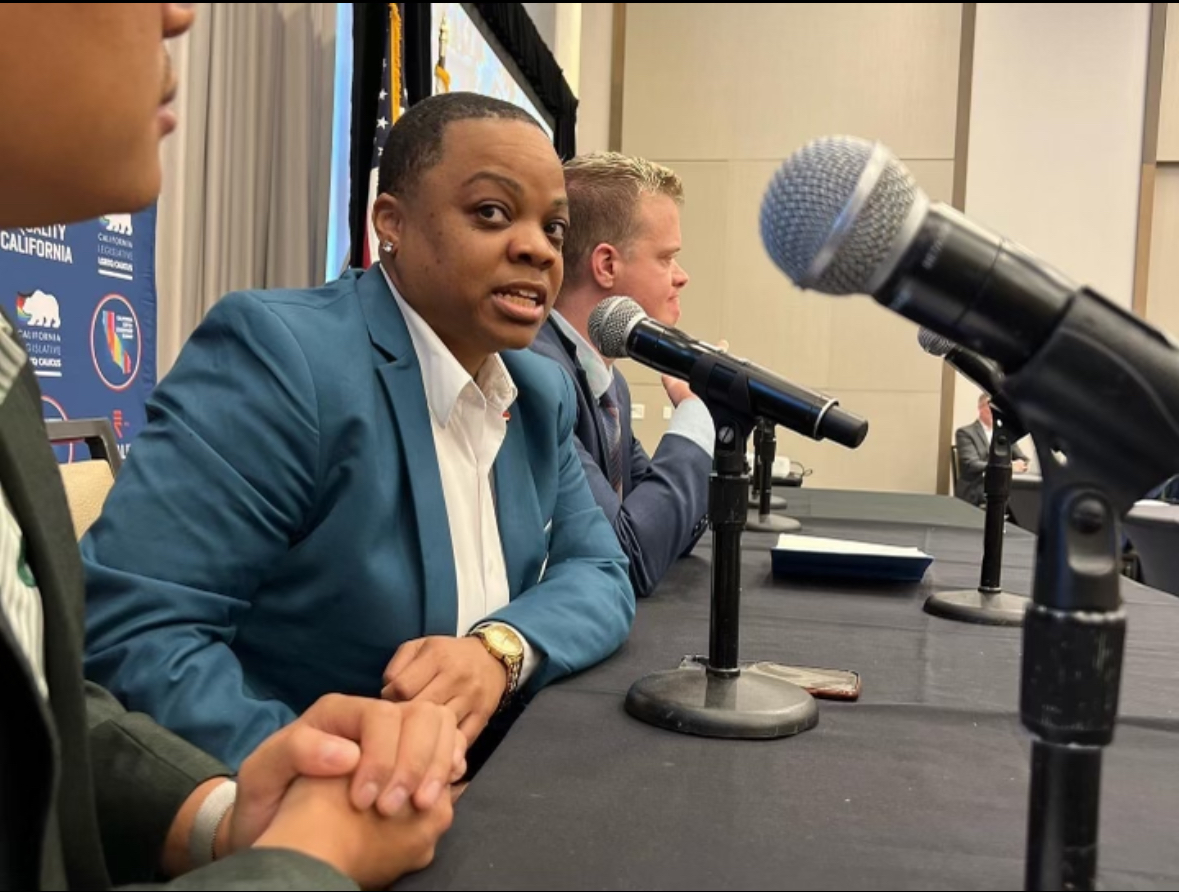
EL CERRITO, Calif. – Carolyn Wysinger is a distinguished figure in both local politics and the LGBTQ+ community having risen as a prominent voice advocating for inclusivity and diversity. Her first term as Mayor Pro-Tem of El Cerrito, California is marked by a robust commitment to visibility and engagement in political arenas.
First elected to the El Cerrito City Council in 2020, Wysinger’s trajectory in politics has been underpinned by her resolve to bring LGBTQ+ voices to the forefront of decision-making. Her work emphasizes the crucial role of allies in combating anti-LGBTQ+ legislation, advocating for a political landscape that welcomes all voices, particularly those from marginalized communities.
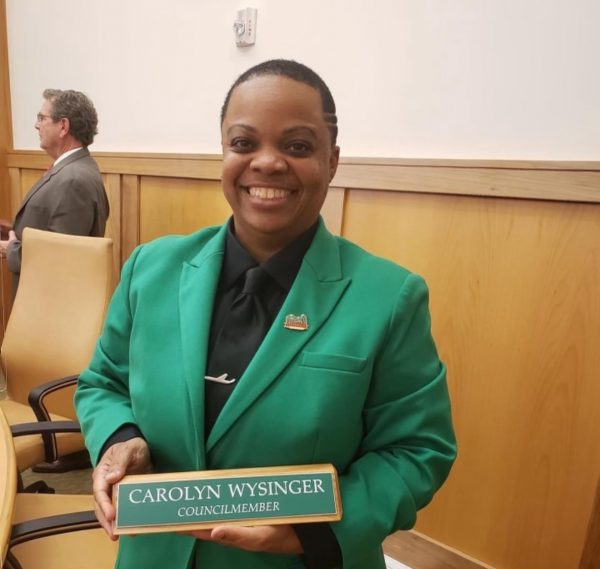
(Photo courtesy of Carolyn Wysinger)
Before venturing into politics, Wysinger made significant contributions to the cultural and educational sectors. A lifelong resident of Contra Costa and a proud graduate with a B.A. in English from California State University, Long Beach, with a M.F.A. from Antioch University, she has also been a vital part of the literary world. Her book, “Knockturnal Emissions: Thoughts on #race #sexuality #gender & #community,” provides insights into diverse identities and has been featured on essential reading lists at several universities.
Wysinger’s influence extends beyond her literary achievements. She has organized notable queer events such as LA’s NFL Sunday Funday and the Long Beach Blue Party, and she has held leadership roles with organizations such as the NIA Collective, San Francisco Pride, and the Human Rights & Relations Commission of Richmond. Her appointment to various committees, including the Economic Recovery Task Force of San Francisco and the Legislative Committee of the California Democratic Party, showcases her broad impact across social and political spheres.
Her community engagement is highlighted by her affiliations with the Sierra Club, NAACP, Black Women Organized for Political Action, and her involvement in the Philonise and Keeta Floyd Institute for Social Change. These roles reflect her deep commitment to addressing systemic inequalities and fostering community solidarity.
In addition to her political and social endeavors, Wysinger is known in her community as an educator who has profoundly impacted the lives of her students at Richmond High School, where she taught English Language Learning, African-American Literature, and led several student groups, including the Black Student Union and LGBTQ Student club.
Wysinger’s Take on Lesbian Visibility Week
In an exclusive interview with The Los Angeles Blade, Wysinger shared her robust insights on the significance of representation and the ongoing struggles and victories of the LGBTQ community during Lesbian Visibility Week.
Wysinger, a steadfast advocate for equal representation in politics, emphasized the necessity of proportional representation of women, including LGBTQ individuals and people of color. “Having a proportional amount of women represented in politics to the constituents is extremely important. We need this not only for women but for everyone in the community,” she explained, underlining the intersectionality of representation.
The current political climate has seen a surge in anti-LGBTQ laws, but Wysinger remains optimistic due to the strong network of allies within California. “It is great to know we have so many allies in California who are fighting in their respective offices to bring equity to our community,” she said.
This network includes notable figures such as London Nicole Breed, the Mayor of San Francisco and State Controller Malia Cohen, who have been pivotal allies, supporting Wysinger as a woman of color in her political journey.
Wysinger also addressed a common narrative that discourages women within the LGBTQ community from seeking elected office. She is committed to dismantling this mindset, attributing her success in leadership to the support from various political queer groups, including Equality California.
Reflecting on the evolution of LGBTQ visibility, Wysinger highlighted the stark contrast between the representation she observed growing up between the Bay Area and Louisiana and the visibility in today’s media.
“Lesbian Visibility Week is something that we did not have back in the ’70s, ’80s, and ’90s when we were being so heavily targeted. This week is a reminder of what we have done in the community and that we are here. It is so important to highlight the queer women who are on the front lines of what we are fighting right now,” Wysinger said.
Wysinger credits her nieces and nephews as a significant inspiration, underscoring the importance of nurturing the future generation of leaders and allies. Her message to the younger generation and to her younger self is resonant with empowerment: quoting a line from the television sitcom “A Different World,” delivered by famed Black comedian Whoopi Goldberg, Wysinger said, “You are a voice in this world, and you deserve to be heard.”
Through her leadership and advocacy, Wysinger continues to champion the visibility and representation of lesbian and queer women, paving the way for a more inclusive and equitable future.
Lesbian Visibility Week
Lesbian Visibility Week, extending the celebration from a single day that began in 2008 to a full week, stands as a vibrant affirmation of solidarity with LGBTQI women and non-binary individuals within the community. This special week spanning April 22-28not only celebrates lesbian identity but also underscores the importance of inclusivity and support for all women, particularly those from marginalized communities.
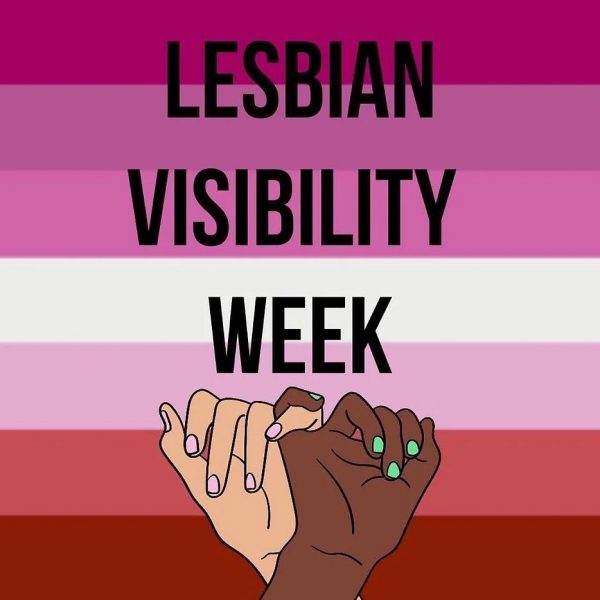
The initiative for Lesbian Visibility Week was catalyzed by concerning findings from the Pride Matters survey conducted by Pride in London in 2018, which revealed that gay women are almost twice as likely to conceal their sexual orientation in the workplace compared to their gay male counterparts. This stark disparity highlights the urgent need for greater visibility and acceptance of lesbian, bisexual, transgender, and queer women both in professional environments and in daily life.
Organized with the support of the Diversity Umbrella Foundation, Lesbian Visibility Week aims to create a more inclusive society where LBTQ women can openly express their true selves without fear of discrimination. Whether it’s at work, at home, or in social settings, the week promotes a culture of understanding and acceptance.
The significance of Lesbian Visibility Week is also reflected in the efforts of DIVA Media Group, Europe’s leading LGBTQ media organization, which reaches an audience of 250,000 users monthly, in partnership with EL*C (Euro Central Asian Lesbian Committee), ILGA World, GLAAD, Curve and LGBT Foundation. Feedback from the community indicates a persistent feeling of being misunderstood and under-supported, further emphasizing the necessity of this observance.
Through a series of events, educational activities, and community engagements, Lesbian Visibility Week not only celebrates the contributions and diversity of lesbian women but also fosters a dialogue about the challenges they face. By doing so, it strives to be a powerful voice for unity, lifting up voices that are too often silenced and paving the way for a more equitable society.
-

 Political commentary & analysis5 days ago
Political commentary & analysis5 days agoAnti-trans British pediatrician backpedals on her review on HRT
-

 Celebrity News4 days ago
Celebrity News4 days agoJodie Foster honored at TCL’s Chinese Theatre handprint event
-
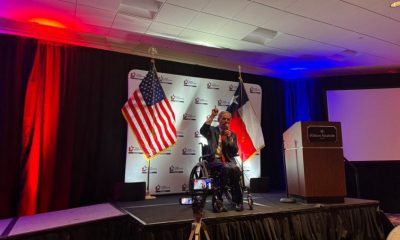
 Texas3 days ago
Texas3 days agoTexas Governor Abbott: “We Want To End” trans teachers
-

 Editor's Letter4 days ago
Editor's Letter4 days agoRemembering Columbine 25 years later, a reporter’s tale
-

 Books4 days ago
Books4 days agoRob Anderson knows you think he’s annoying
-
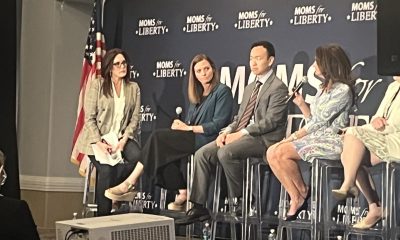
 North Carolina3 days ago
North Carolina3 days agoRaleigh N.C. Moms for Liberty panel touts anti-LGBTQ+ agenda
-
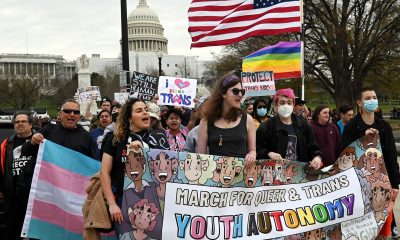
 Research/Study19 hours ago
Research/Study19 hours ago90 percent of trans youth live in states restricting their rights
-

 Research/Study4 days ago
Research/Study4 days agoSame-sex couples vulnerable to negative effects of climate change
-

 Books5 days ago
Books5 days agoOut CBS reporter Jon Vigliotti recounts covering a warming planet
-
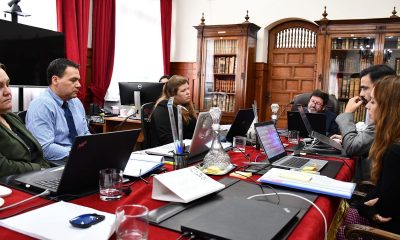
 South America4 days ago
South America4 days agoDaniel Zamudio killer’s parole request denied by Commission

